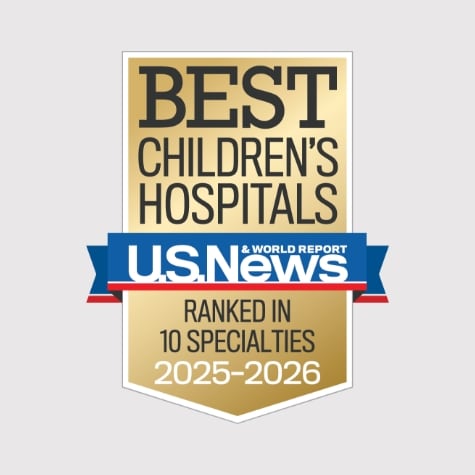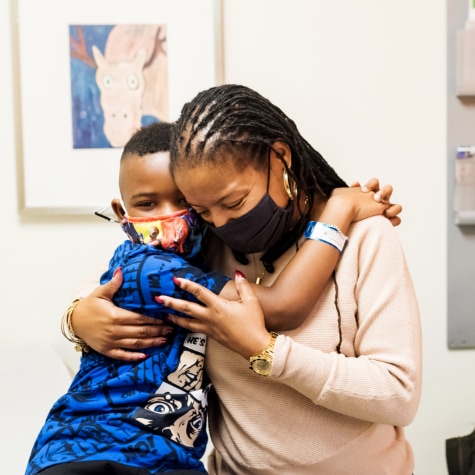T32 Hematology Training Program
The Emory University School of Medicine T32 Hematology Training Program addresses the crucial need for programs to train physician scientists and clinical investigators in pediatric nonmalignant hematology. Research in hematology—particularly in pediatrics—has explained many of the genetic, cellular and molecular mechanisms underlying disease processes as well as fundamental cellular functions, such as cell differentiation and gene regulation. Embedded in the largest clinical pediatric hematology program in the country at the Aflac Cancer and Blood Disorders Center of Children's Healthcare of Atlanta, our T32 Hematology Training Program provides huge patient volumes for clinical and translational research.
The T32 Hematology Training Program offers rigorous training in basic and translational research to postdoctoral MD, MD/PhD and PhD fellows under the mentorship of 28 faculty members supported by more than $25 million in extramural funding (more than $17 million from federal sources). Integrated into the highly successful Pediatric Hematology/Oncology and Blood and Marrow Transplant (BMT) fellowship programs, the T32 Hematology Training Program admits two trainees for two years of support, training five to seven MD fellows and three to five PhD postdoctoral fellows over five years.
Children’s Healthcare of Atlanta and Emory University: A historic partnership of pediatric excellence

In 1956, the Board of Trustees for both Emory University and Egleston Hospital signed an agreement to make Egleston a first-rate teaching hospital
Children’s is one of the largest freestanding healthcare systems in the country. Emory is one of the nation’s leading research universities. Together, the two share a passion for pediatric innovation and advancements. In 1956, Children’s Healthcare of Atlanta’s Egleston Hospital and Emory University first established a pediatric teaching relationship. This relationship has developed to facilitate leading-edge pediatric research, training and innovation.
Children’s and Emory University School of Medicine partner together on pediatric residency and fellowship training programs as well as the management and execution of clinical trials. Discoveries in Emory’s research laboratories are translated into lifesaving treatments at Children’s. Emory and Children’s share a unique employment agreement; more than 400 physicians hold titles at both independent institutions.

National Honors from U.S. News & World Report
Children’s ranks among the nation’s top pediatric hospitals on the U.S. News & World Report list of “Best Children’s Hospitals.” The report ranks hospitals for excellence in outcomes, program structure and national reputation in 10 pediatric specialty areas.
Our Awards
Why Atlanta?
In addition to our unique neighboring pediatric partners, Atlanta is full of diverse communities, walkable neighborhoods, a thriving arts and culture scene, and plenty of green spaces and sunny weather—it’s pretty easy to fall in love with our charming city.
Make Atlanta HomeExecutive committee:
- Shannon Meeks, MD, Director
- Clinton Joiner, MD, PhD, Co-Director
- Douglas Graham, MD, PhD
- Wilbur Lam, MD, PhD
- Katie Sutton, MD
- Dan Wechsler, MD, PhD
- Ricardo Forts
- Gary Lindsay, Senior Program Coordinator
Clinical co-mentors and their Labs:
Research Mentors and their Labs:
- David Archer, PhD | See Lab
- Edward Botchwey, PhD | See Lab
- Erin Buckley, PhD | See Lab
- Kevin Bunting, PhD | See Lab
- Satheesh Chonat, MD | See Lab
- Chris Doering, PhD | See Lab
- Mandy Ford, PhD | See Lab
- Douglas Graham, MD, PhD | See Lab
- Edwin Horwitz, MD, PhD | See Lab
- Clinton Joiner, MD, PhD | See Lab
- Wilbur Lam, MD, PhD | See Lab
- Pete Lollar, MD | See Lab
- Cheryl Maier, MD, PhD
- Shannon Meeks, MD | See Lab
- David R. Myers PhD | See Lab
- Manu Platt, PhD
- C.K. Qu, MD, PhD | See Lab
- John Roback, MD, PhD | See Lab
- Krishnendu Roy, PhD
- Vivien A. Sheehan, MD/PhD
- Trent Spencer, PhD | See Lab
- Jonathan Stiles, PhD
- Edmund Waller, MD, PhD | See Lab

Why Children's?
We manage one million patient visits annually at three hospitals, Marcus Autism Center, the Center for Advanced Pediatrics, urgent care centers and neighborhood locations.
Learn moreEach trainee will have a primary research mentor and a clinical co-mentor to foster basic, translational, or clinical research relevant to pediatric hematology. Pairing of senior mentors with junior mentors from a pool of 11 young faculty members will expand the supply of future mentors.
In addition to rigorous research training, trainees will participate in an ethical research course, departmental career development seminars, grant writing and academic skills training, research conferences, journal clubs, and fellowship program research retreats. Individual training plans will be developed for each trainee, and progress will be monitored by a multidisciplinary scholarship oversight committee (SOC). Formal training in clinical research methodologies is also available for PhD trainees.
Trainees will present their work at national meetings and develop applications for career development awards (K awards).
MD and PhD fellows within Children's and Emory, as well as external MD and PhD candidates, are chosen on the basis of their prior training and research accomplishments, academic potential, and commitment to research in nonmalignant hematology.
Applicants should submit a CV and a research proposal to Shannon Meeks, MD, Program Director, Clinton Joiner, MD, PhD, Associate Director, and Gary Lindsay, Senior Program Coordinator. The research proposal should contain specific aims (no more than one page), a research plan (no more than three pages) and a training plan (one page), including proposed members of the applicant’s SOC. The SOC should consist of a member of the T32 executive committee as the chairperson as well as a research mentor, a clinical co-mentor and other scientific advisors as needed (see above for full list of mentor options).
Gary Lindsay, Senior Program Coordinator
Contact Us Gary Lindsay

